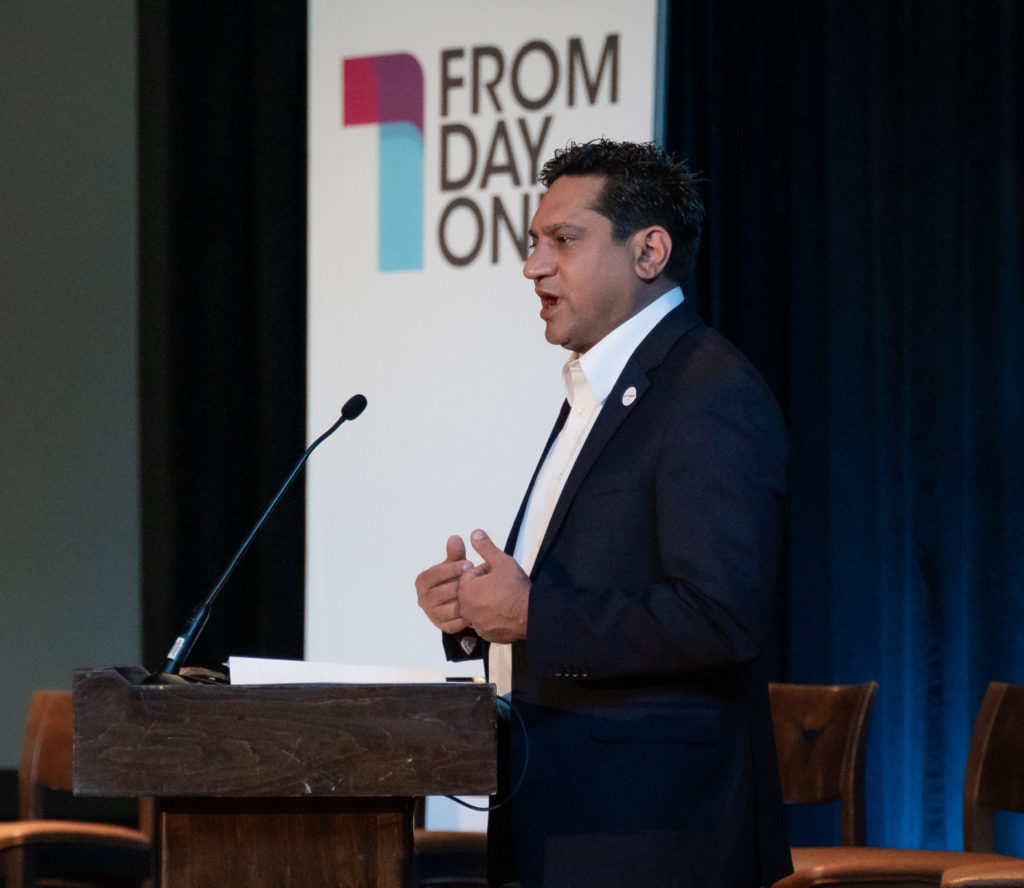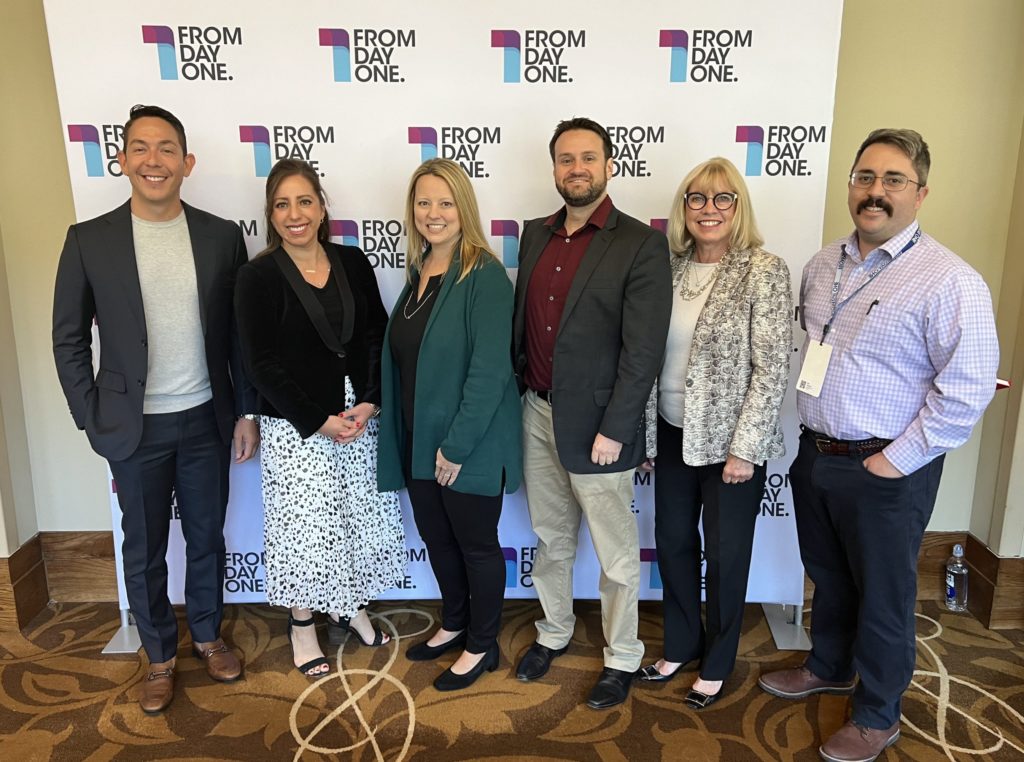In Pursuit of Talent, ‘Everyone in Your Company Is Evangelizing for You’


The American Dream promises “a land in which life should be better and richer and fuller for everyone, with opportunity for each according to ability or achievement and not birth or wealth.”
In introducing a panel discussion at From Day One’s Austin conference, Sayar Lonial, associate dean of communications and public affairs at New York University’s Tandon School of Engineering, cited the phrase coined by NYU Tandon alum James Truslow Adams as inspiration for creating opportunity for workers who might otherwise be overlooked. The panel of five expert speakers discussed “Improving the Talent Pipeline, From End to End,” moderated by Austin Business Journal Managing Editor Will Anderson, identifying ways to expand their talent searches to be more inclusive and innovative.
To start with, laying the foundation of an honest and transparent public image will make a company better able to attract and retain skilled talent, said Lynn Marie Finn, president and CEO of the talent-management platform Broadleaf. Indeed, an inclusive company culture has become increasingly important in the new, hybrid workplace, whether you’re a big company like Google or a fast-growing startup like the news organization Axios.
Standing Out From the Corporate Crowd
Israel Gutierrez, VP of talent acquisition at Axios, said that for an emerging employer, showing up at job fairs and other events that are aimed to expand diversity, equity, and inclusion (DEI) is a great way to stand out and prove your company is taking that extra step. “We were the only ones who were at every single one of the five underrepresented conferences, which spoke heavily to our commitment to diversity, equity, and inclusion, but also around how we want to get our name out there,” he said. “We’re only five years old, but growing rapidly, so it’s important to get our name out there in front of candidates at every single possible opportunity.”
From niche strategy to broad goals, Google Cloud’s executive recruiting practice leader Melissa Santarcangelo made the assertion that talent starts with instilling shared values in recruiters. “It just takes people who are willing to have these conversations internally to create consistency and how we’re having those conversations with candidates,” she said. Whether it be social responsibility or a cause important to the company, every level of employment should be on the same page.
In a 2016 study cited by Broadleaf’s Finn, 64% of millennials polled said they would not take a position at a socially irresponsible company. “You need to make sure that you are encapsulating your culture as you”re putting that brand out there in all of the different areas: your website, job platforms, all kinds of recruiting tools, as your authentic self. And again, what’s in it for them?”

Moderator Anderson noted, however, that most potential hires create an opinion of the company before anyone reaches out to them. Just as companies seek information about potential new hires through multiple avenues, interested candidates do the same with the company they’re applying to, Finn said.
Jeremy Schiff, CEO of the recruiting platform RecruitBot, shared his perspective on the backend of recruiting: reaching out to potential hires, choosing the right language, and following through with DEI efforts. “Everyone in your company is ultimately evangelizing for you,” Schiff said. “[Employers should make sure] that you’re having conversations across everyone and balancing, having a consistent message with one that’s authentic to the person.”
Broadening the Funnel
Schiff asserted that when trying to meet DEI efforts, a company cannot forget that this starts with confronting biases and steering clear from tokenism. In order to do this, any identifiable demographic traits would be cleared before the recruitment process began. “You can literally, with a toggle switch, get rid of names, which can really mitigate a lot of the bias. We also use machine learning that will automatically find people who are similar to what you’re looking for, but it’s all focused on the position,” he said. “I've literally spoken to people that are like, ‘Can you add photos? I know what a person who looks smart looks like.’ Those sorts of statements terrify me, so no, you can’t do that on our platform. We make that really difficult on purpose.”
For all these leaders and companies, a major part of their mission is to reach their diversity goals. Jeanine Steele, head of global talent acquisition for Advanced Micro Devices (AMD), said their team achieved better results in the past year after becoming more purposeful in their outreach.
Added Broadleaf’s Finn: “If you don’t have a very strong DEI and B initiatives in your company–B being belonging–you’re not going to get the right talent pipeline, it just won’t happen. The way you develop that is you have to do it with your staff.”
Leading With Humanity
Google’s Santarcangelo stressed that in the recruitment process, honesty is a crucial factor in ridging the gap between recruiter and potential candidate, as well as an effective way of boosting employee retention, positive company culture, and most importantly, belonging.

“It was honesty and human forwardness,” Santarcangelo said. When hiring at Google slowed during its recent hiring “reprioritization,” leaders were encouraged to be transparent in order to bring a more humanistic approach to the process. Maintaining an open dialogue with candidates can help with keeping a good reputation as an employer, and eventually, reaching out to the candidate when space allows it. “But it’s really, truly just being human and respecting people’s intelligence.”
A company is only as good as its staff, and according to Santarcangelo, spending large amounts of money isn’t the only way to entice and retain good working relationships within the company. “You don't need a lot of training, you don’t need extra budget. You need a little bit of extra time and people who care to do it,” she said. “There’s nothing more authentic than to have somebody who’s doing that job, say why they’re there, or why they believe in what they’re doing.”
The speakers stressed how important it is for HR leaders to study the data from their DEI initiatives in order to identify deficiencies, while also celebrating the successes. “Having that data about the entire pipeline will help those DEI initiatives across the board,” Gutierrez said.
Lauren Castro is a freelance writer and photographer with work in Texas Monthly, Flaunt magazine, Alcalde, and other publications.
The From Day One Newsletter is a monthly roundup of articles, features, and editorials on innovative ways for companies to forge stronger relationships with their employees, customers, and communities.